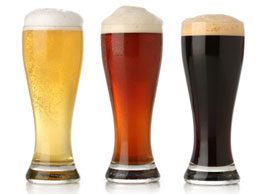The health benefits of beer
Thanks to the so-called beer belly, beer has gotten a reputation as a bad-for-you beverage. But enjoyed responsibly, beer can actually be a healthier drink choice

Source: Web exclusive, October 2010
Sometimes, nothing but a cold glass of beer will do, especially when you’re at the game or visiting your neighbourhood pub with friends. But can sipping a pint be part of a healthy lifestyle?
‘There’s a strong association between beer and the beer belly, so people automatically assume that beer is fattening or unhealthy,’ says beer sommelier Mirella Amato, who specializes in the selection and service of ales. ‘But that’s just not true.’
Shocking, isn’t it? But consider this: Beer is fat-free, cholesterol-free and low in carbohydrates‘a 341-mL bottle of beer with 5 percent alcohol has 5 g of carbohydrates, while a pear with the skin on has 26 g.
Now we’re not saying you should trade your fruits and veggies in for a steady diet of suds, but enjoying beer in moderation can actually be a healthier beverage choice than soda or sugary fruit cocktails. ‘Picking beer over another beverage if you’re counting your calories is wise,’ says Amato.
Beer can be nutritious
Beer is made from hops, barley and wheat, so the beverage contains many of the same nutrients that grains do, including B vitamins, riboflavin, niacin and zinc. A bottle of beer can contain 92 mg of potassium, 14 mg of calcium and 48 mg of phosphorus, all minerals that are essential to a healthy diet.
Beer is also a source of soluble fibre, which comes from the barley. According to The Brewers of Europe, an organization that represents European breweries, two glasses of beer can provide 10 percent of your recommended daily fibre intake.
Beer contains antioxidants as well. A study published in the Journal of Nutrition and Biochemistry suggests that the levels of antioxidants found in blood are elevated after beer is consumed.
Beer can ward off disease
Many studies have found that moderate alcohol consumption may lower a drinker’s risk of diseases such as Alzheimer’s disease and diabetes, and can even reduce weight gain. But some research suggests that beer specifically may play a role in fending off disease.
A study published in the Journal of the Science of Food and Agriculture suggests that drinking beer moderately may ward off osteoporosis. The researchers found that beer is a good source of dietary silicon, which is important for bone growth and development.
Beer may also help reduce cancer risk. Studies suggest that Xanthohumol, a plant compound found in hops, may help prevent cancer, as well as reduce menopausal hot flashes and fight off osteoporosis.
Are light beers better?
If you’re counting your calories, you may gravitate toward so-called light beers. Amato notes that there are many tasty light beers on the market and those are great choices if you like the flavours. But don’t feel like you have to forgo your favourite brand if you’re watching your weight’there isn’t actually a big difference between most light beers and a regular bottle of brew. For example, a 342 g bottle of beer with five percent alcohol has about 140 calories, while a light beer with four percent alcohol has about 100 calories.
The reason that light beers are slightly lower in calories is because they contain less alcohol. ‘About three quarters of the calories in beer come from alcohol and one quarter come from the grains,’ Amato says. So the higher the alcoholic content of your beverage, the higher the calories. You may be surprised to know that a bottle of dark, rich-tasting Guinness contains just 126 calories. That’s because it has 4.3 percent alcohol, says Amato. ‘It’s essentially a light beer, but it doesn’t have a light flavour.’
The scoop on ultra-light beers
A few light beers on the market boast less than 100 calories, while still containing four percent alcohol. With those beers, Amato says, something is likely being substituted for the gains. ‘They’re getting rid of the carbs as opposed to the alcohol, she notes. ‘My concern with that is that a lot of the vitamins and minerals in beer come from the grains. If you’re trimming down the grains to save calories, you’re also reducing the nutritional value.’
How to choose the right brew for you
When choosing a beer, the key is to select a flavour you enjoy and always exercise restraint when you’re out at the pub. ‘Personally, I would lean toward quality over quantity, so drink a tastier beer and drink a little bit less,’ Amato advises. ‘And don’t eat the bar food.’ Snacking on wings and chips will expand your waistline much faster than the pint you’re sipping.
Don’t miss out! Sign up for our free weekly newsletters and get nutritious recipes, healthy weight-loss tips, easy ways to stay in shape and all the health news you need, delivered straight to your inbox.




